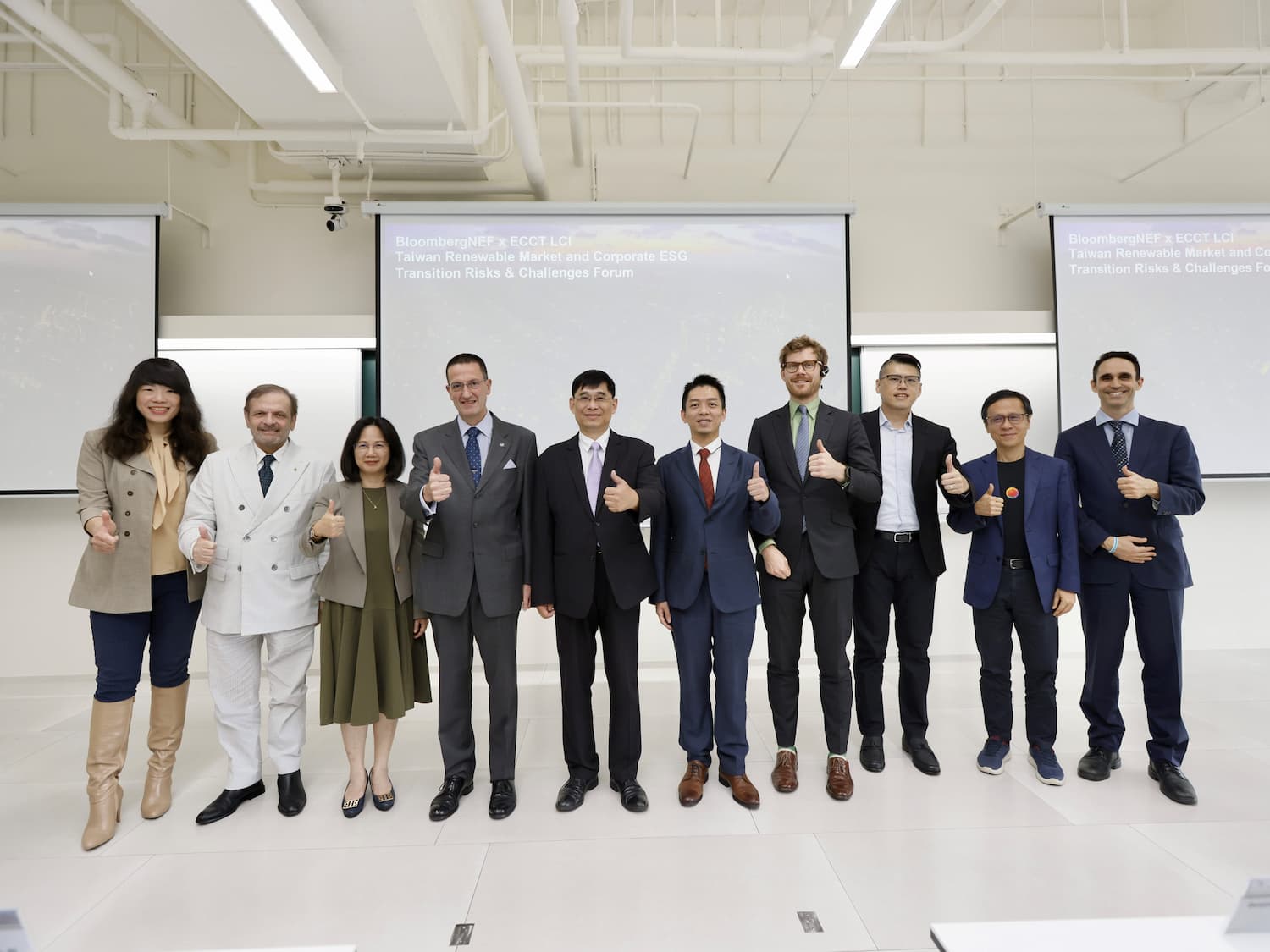Renewable market and ESG transition forum

The "Taiwan Renewable Market and Corporate ESG Transition Risks & Challenges Forum" was organised by BloombergNEF and the ECCT's Low Carbon Initiative (LCI) in cooperation with the EU Centre in Taiwan (EUTW).
At the forum, opening remarks were made by Yew Wei Ong, Bloomberg General Manager; Lee Chun-li, MOEA Energy Administration Deputy Director-General and ECCT CEO Freddie Höglund. This was followed by presentations and a panel discussion featuring prominent keynote speakers and panellists who shared insights on the risks and challenges facing corporations operating in Taiwan in their quest to transition to renewable energy sources.
Speakers included Jonas Rooze, Global Head of Sustainability and Climate Research of BloombergNEF; Lee Chun-li, Deputy Director General of the Ministry of Economic Affairs’ (MOEA) Energy Administration (EA); Ben Lu, Director and Head of Renewable & Traditional Industries for Credit Agricole CIB and Esther Fang Wen, Senior Offshore Wind Policy Analyst for the Global Wind Energy Council (GWEC). The keynote speakers (besides Lee Chun-li) were then joined in an hour-long panel discussion by Sean McDermott, Managing Director of Development, Taiwan, at Northland Power, and Dr Tom Koh, Chief Technology Officer of Taiwan Mobile. Standing in for Lee Chun-li in the discussion was Weng Su-chen, Secretary General of the EA. The panel discussion was moderated by Daniel Chiu, Relationship Manager for Bloomberg.
In his presentation, Jonas Rooze said that of the world’s current 160 largest emitters, 140 (which together account for 25% of global emissions) had committed to reaching net zero by 2050 or earlier. While many of the earlier targets set by emitters were not credible because they excluded indirect (or so-called scope 3 emissions), such as emissions used to create steel and the fuel used to power vehicles during their lifetimes, many companies are now including scope 3 emissions in their targets.
Reaching net zero goals will require substantial investments in existing technologies as well as new technologies not yet commercialised. Some emissions will not be able to be eliminated and will have to be offset. Bloomberg was one of the parties responsible for exposing a lot of fraudulent and suspect carbon offset programmes. There will therefore be a lot more scrutiny of offset schemes in the future to make sure that they are really working and, according to Rooze, it is likely that only the high quality market for offsets will ultimately survive.
The global CPPA has grown strongly in recent years, although there has been a drop in the United States in 2023. The market in Europe continues to grow. However, tenures are getting shorter, which is a natural development since few businesses have long enough outlook horizons to commit to tenures of up to 20 years, that was previously expected. More companies are now demanding clean energy around the clock, which is challenging to meet.
In his presentation, Lee Chun-li gave an update on Taiwan’s energy transition, noting that the share of renewables in the energy mix was still at only 8.3%, nuclear at 8.3% and coal, natural gas making up the rest. Taiwan’s net zero goals by 2050 include 60-70% from renewables, 20-27% from natural gas with carbon capture and storage and 9-12% from hydrogen. This will entail considerable scaling up of both solar and offshore wind power over the next 27 years. According to Lee, 260 offshore wind turbines are already in place, although not all of them have been connected to the grid yet.
Regarding floating offshore wind energy, two pilot projects have been announced with the possibility of one other project. Each project will have 6-12 platforms (the number and size of turbines is not specified in order to provide flexibility to developers). Each project proposal will first have to pass an environmental impact assessment. More details will be released by the end of the year and projects will be awarded in 2024. Regarding financing of renewable energy, Lee said that the government will back a credit guarantee mechanism to help SMEs get access to financing.
In his presentation Ben Lu said that part of his group’s commitment to reach net zero is a gradual reduction in exposure to fossil fuel companies and a converse commitment to increase exposure to renewable energy. The group is also cutting its exposure to commercial real estate.
In her presentation (via video recording), Esther Fang gave an update on the status of wind energy developments both globally and in the Asia Pacific region.
